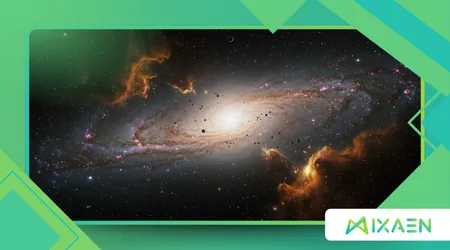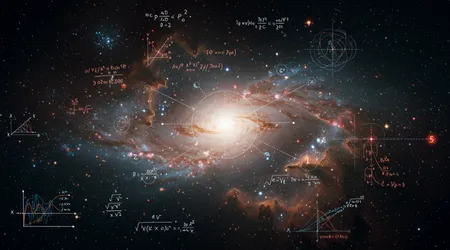The Fine-Tuning Argument: Coincidence or Design?

The fine-tuning argument captivates minds, sparking debates about whether the universe’s precise conditions for life suggest mere chance or intentional design.
Anúncios
This philosophical puzzle, rooted in cosmology and metaphysics, probes the very fabric of existence. Why do physical constants align so perfectly to allow stars, planets, and life to emerge?
Is it a cosmic fluke, or does it hint at a purposeful intelligent framework? This article dives into the fine-tuning argument, exploring its scientific foundations, philosophical implications, and the spirited discourse it ignites.
From the Big Bang’s delicate balance to modern discoveries in physics, we’ll unpack the evidence, weigh competing perspectives, and invite you to ponder the universe’s deeper truths.
The topic resonates in 2025, as breakthroughs in cosmology like the James Webb Space Telescope’s revelations about early galaxies fuel discussions on the universe’s origins.
The fine-tuning argument bridges science and philosophy, captivating researchers, theologians, and curious minds alike. It’s not just about equations; it’s about meaning.
Let’s embark on this intellectual journey, blending rigorous analysis with accessible insights, to explore whether the cosmos is a product of chance or a meticulously crafted design.
The Science Behind Fine-Tuning
The fine-tuning argument hinges on the universe’s physical constants, which seem exquisitely calibrated to support life.
Take the gravitational constant: if it were slightly stronger, stars would collapse too quickly for life to evolve; slightly weaker, and galaxies wouldn’t form.
The cosmological constant, governing the universe’s expansion, is another example.
A 2018 study by physicist Luke Barnes noted that if this constant varied by one part in 10^120, life as we know it would be impossible. Such precision raises eyebrows.
This delicate balance extends to other constants, like the strong nuclear force. Too strong, and atoms would bind too tightly, preventing complex chemistry; too weak, and stars couldn’t fuse elements.
These parameters, established within moments of the Big Bang, form a narrow window for life.
The fine-tuning argument suggests this precision is unlikely to occur by chance, prompting questions about underlying causes.
Consider the analogy of a cosmic dial. Imagine a radio with billions of dials, each set to an exact frequency to play a clear song life.
++ How Many Dimensions Could Exist in the Universe?
One wrong turn, and it’s static. The fine-tuning argument asks: who or what tuned the d_forest: dials?
Scientists like Paul Davies emphasize this improbability, noting the universe’s life-permitting conditions are statistically extraordinary.
Yet, fine-tuning doesn’t prove design. Some physicists argue that unknown laws might necessitate these constants.
Ongoing research into quantum gravity and string theory seeks such explanations.
Without them, the fine-tuning argument remains a compelling challenge to purely naturalistic views, urging deeper exploration of the cosmos’s origins.

Philosophical Implications of Fine-Tuning
The fine-tuning argument transcends science, diving into philosophy’s murky waters. If the universe is fine-tuned, does it imply a purposeful intelligent design?
Theists argue yes, seeing a deliberate plan. Atheists counter that chance or necessity could explain it, dismissing design as anthropocentric. The debate hinges on interpreting probability.
Design advocates point to the improbability of life-friendly constants. William Lane Craig argues the odds favor a purposeful cause over random chance.
Also read: The Concept of Nothingness in Science and Philosophy
Conversely, philosophers like David Hume warn against projecting human intentions onto cosmic phenomena. The fine-tuning argument thus becomes a battleground for worldviews.
What if our universe is one of many? The multiverse hypothesis suggests countless universes with varying constants, making ours unsurprising.
Critics, however, argue this lacks empirical evidence, relying on speculative physics. The James Webb Telescope’s 2025 data on early galaxy formation hasn’t settled this, but it fuels multiverse debates.
The fine-tuning argument also raises existential questions. If designed, what’s the designer’s nature? If not, how do we grapple with cosmic luck?
These questions challenge our understanding of reality, pushing philosophy to confront science head-on, with no easy answers.
The Multiverse Counterargument
Could a multiverse negate the fine-tuning argument? This hypothesis posits infinite universes with different constants, where ours happens to support life.
It’s an elegant solution: no need for design if every possibility exists. But elegance doesn’t equal evidence. No experiment has confirmed other universes.
Theoretical physicists like Sean Carroll support the multiverse, citing inflationary cosmology as a clue. Inflation, post-Big Bang, might spawn bubble universes.
Rad more: The Anthropic Principle: Why Does the Universe Seem Made for Us?
Yet, critics like Roger Penrose argue this is untestable, verging on philosophy, not science. The fine-tuning argument persists because multiverses remain hypothetical.
Imagine a cosmic lottery with infinite tickets. Ours wins, but only because every number is drawn somewhere.
This diminishes the fine-tuning argument’s weight for some, but others see it as dodging the question. Without direct evidence, multiverse theories struggle to dismantle the design hypothesis.
The lack of multiverse data keeps the debate alive. In 2025, experiments at CERN probe extra dimensions, potentially supporting multiverse models.
Until then, the fine-tuning argument holds ground, challenging skeptics to explain our universe’s uncanny precision without invoking design.
Critiques and Challenges
Skeptics of the fine-tuning argument argue it overstates improbability. Life might adapt to different constants, they claim, citing speculative astrobiology.
Perhaps carbon-based life isn’t the only form possible. This weakens the need for fine-tuning, but lacks concrete examples.
Another critique questions the argument’s logic. Philosophers like Elliott Sober argue that assuming design begs the question of a designer’s existence.
Without independent evidence, the fine-tuning argument risks circularity. Science, they insist, should stick to testable hypotheses, not metaphysical leaps.
Yet, defenders highlight the argument’s strength: it forces explanations.
The 2023 discovery of unexpected galactic structures by the James Webb Telescope intensified scrutiny of cosmic models, indirectly bolstering fine-tuning discussions.
Critics must address why our universe, against astronomical odds, supports life.
The debate isn’t just academic. It shapes how we view our place in the cosmos. Is humanity a cosmic accident or part of a grand plan?
The fine-tuning argument keeps this question alive, demanding rigorous thought over dogmatic dismissal.
A Table of Key Physical Constants
| Constant | Role | Fine-Tuning Precision |
|---|---|---|
| Gravitational Constant | Governs gravitational force | ±1% would disrupt star formation |
| Cosmological Constant | Drives universe’s expansion | ±10^-120 would prevent life |
| Strong Nuclear Force | Binds atomic nuclei | ±5% would halt fusion or chemistry |
| Electromagnetic Force | Governs electron interactions | ±10% would alter chemical bonds |
Cultural and Ethical Reflections
Beyond science and philosophy, the fine-tuning argument influences culture and ethics. If the universe is designed, it could imply purpose, affecting moral frameworks.
Theistic perspectives often tie fine-tuning to divine responsibility, promoting stewardship of life.
Conversely, a chance-based universe might emphasize human autonomy. Existentialists like Sartre would argue we create our own meaning, regardless of cosmic origins.
The fine-tuning argument thus shapes societal values, from environmentalism to human rights debates.
Consider the ethical stakes. A designed universe might inspire awe, urging care for creation.
A random one might fuel nihilism or freedom. In 2025, global discussions on AI ethics echo this: is technology’s rise purposeful or coincidental?
The fine-tuning argument also impacts education. Teaching it sparks critical thinking, blending science with philosophy.
It encourages students to question, not just memorize, fostering a generation ready to tackle existential mysteries with nuance.
Frequently Asked Questions
What is the fine-tuning argument?
It posits that the universe’s physical constants are precisely set for life, suggesting either design or extraordinary coincidence.
Does the multiverse disprove fine-tuning?
No, the multiverse hypothesis is unproven. It offers an alternative explanation but lacks empirical evidence as of 2025.
How does fine-tuning affect everyday life?
It shapes philosophical and ethical perspectives, influencing views on purpose, morality, and humanity’s role in the cosmos.
Is fine-tuning a scientific or philosophical issue?
Both. It’s grounded in scientific data but raises philosophical questions about design, chance, and the nature of reality.
This exploration of the fine-tuning argument reveals a universe teetering on the edge of impossibility.
Whether you lean toward design or chance, the question lingers: why is the cosmos so perfectly suited for us?
As science advances, the debate will evolve, but the mystery endures, inviting us to wonder, question, and seek truth in the stars.
